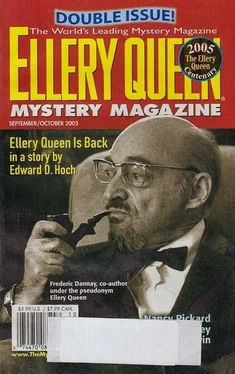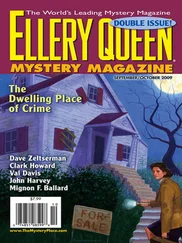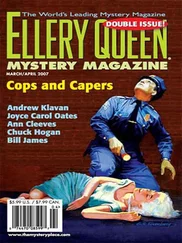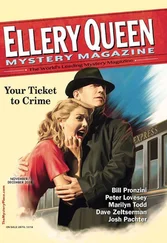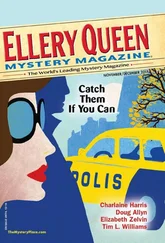Тимоти Уилльямз - Ellery Queen’s Mystery Magazine. Vol. 126, No. 3 & 4. Whole No. 769 & 770, September/October 2005
Здесь есть возможность читать онлайн «Тимоти Уилльямз - Ellery Queen’s Mystery Magazine. Vol. 126, No. 3 & 4. Whole No. 769 & 770, September/October 2005» весь текст электронной книги совершенно бесплатно (целиком полную версию без сокращений). В некоторых случаях можно слушать аудио, скачать через торрент в формате fb2 и присутствует краткое содержание. Город: New York, Год выпуска: 2005, Издательство: Dell Magazines, Жанр: Детектив, на английском языке. Описание произведения, (предисловие) а так же отзывы посетителей доступны на портале библиотеки ЛибКат.
- Название:Ellery Queen’s Mystery Magazine. Vol. 126, No. 3 & 4. Whole No. 769 & 770, September/October 2005
- Автор:
- Издательство:Dell Magazines
- Жанр:
- Год:2005
- Город:New York
- ISBN:нет данных
- Рейтинг книги:4 / 5. Голосов: 1
-
Избранное:Добавить в избранное
- Отзывы:
-
Ваша оценка:
- 80
- 1
- 2
- 3
- 4
- 5
Ellery Queen’s Mystery Magazine. Vol. 126, No. 3 & 4. Whole No. 769 & 770, September/October 2005: краткое содержание, описание и аннотация
Предлагаем к чтению аннотацию, описание, краткое содержание или предисловие (зависит от того, что написал сам автор книги «Ellery Queen’s Mystery Magazine. Vol. 126, No. 3 & 4. Whole No. 769 & 770, September/October 2005»). Если вы не нашли необходимую информацию о книге — напишите в комментариях, мы постараемся отыскать её.
Ellery Queen’s Mystery Magazine. Vol. 126, No. 3 & 4. Whole No. 769 & 770, September/October 2005 — читать онлайн бесплатно полную книгу (весь текст) целиком
Ниже представлен текст книги, разбитый по страницам. Система сохранения места последней прочитанной страницы, позволяет с удобством читать онлайн бесплатно книгу «Ellery Queen’s Mystery Magazine. Vol. 126, No. 3 & 4. Whole No. 769 & 770, September/October 2005», без необходимости каждый раз заново искать на чём Вы остановились. Поставьте закладку, и сможете в любой момент перейти на страницу, на которой закончили чтение.
Интервал:
Закладка:
** Alex Flinn: Fade to Black, HarperTempest, $16.99. This young adult “problem” novel, concerning an attack on an HIV-positive Florida high school student and the classmate who becomes the obvious suspect, is sensitively written and should enthrall its target readership, but it works better as tolerance lesson than mystery. The novel seeks to explode myths about HIV, but the way the student was infected, though possible, is among the least likely modes of transmission.
** J.A. Konrath: Bloody Mary, Hyperion, $22.95. The second case for Chicago police detective Jacqueline “Jack” Daniels moves from the hunt for a serial killer who leaves behind dismembered body parts to a get-the-scumbag legal novel. The most interesting sequences involve the killer’s methods of beating the polygraph and his other efforts to get off on an insanity plea. Like so many in the current market, the novel has too much emphasis on the main character’s romantic and family life. Also used as pad-ding are “humanizing” cop conversations that hark back to Dragnet.
** Stephen Spignesi: Dialogues, Bantam, $23. Why did Tory Troy, an animal-shelter euthanasia technician, murder six of her colleagues in the shelter gas chamber, and is she competent to stand trial? This ambitious first novel, told almost entirely in dialogue, starts beautifully and grips the reader for most of its length, but loses credibility with some unconvincing courtroom action. The conclusion is a variation on an old chestnut that sometimes works but this time doesn’t.
The Aura of an Alpha Wolf
by Jeremiah Healy
Jeremiah Healy is the author of 18 crime novels (including Turnabout, a 2005 Leisure Books mass-market reprint) and over 60 short stories, some of each under his pseudonym “Terry Devane.” He was the first North-American president of the International Association of Crime Writers and also the American Guest of Honour at the 35th Bouchercon World Mystery Convention in Toronto.
“Mr. Cuddy?” said the woman in the corridor, peering like a Marx Brother around the edge of my partially opened office door.
I stood from behind my desk, gesturing to the stenciled “JOHN FRANCIS CUDDY: CONFIDENTIAL INVESTIGATIONS” on the pebbled glass above the midway point of my door. “That’s right.”
The woman now shuffled over the threshold. “I thought there’d be, like, a secretary, you know?”
The influence of television. “If I had an assistant of any kind, I’d have to charge twice my hourly rate.”
The woman nodded uncertainly, as though she’d have preferred to hear that my assumed secretary was home sick, but she still came fully into view, closing the door behind her. She shrugged out of the heavy coat that Decembers in Boston require, which gave me a chance to gauge her.
About thirty and medium height, with a stolidness beyond baby-fat. Matte-brown hair framed a face that once had battled acne and lost, leaving a pitted surface makeup didn’t quite cover. Her eyes — brown also, as she approached my desk — appeared bloodshot, which I sensed was from crying over some recent tragedy rather than from drowning it with a bottle.
“I’m Tamara Sinclair, but everybody calls me Tammy.”
She extended her right hand and we shook, the surname ringing a vague bell.
As Sinclair settled into one of the two client chairs across from me, I sat back down in mine. “What can I do for you?”
She fidgeted a bit, as most people will in talking with a private investigator. “It’s about my father. And his murder.”
The penny dropped. “Professor Brant Sinclair, at Corbin University?”
“Yes.”
I’d had a past case involving Corbin, a small but prestigious school past Fenway Park that had stepped up from “college” to “university” during the interim. “The news stories said your father was killed in his loft apartment last week, apparently by a burglar?”
“So the police think.” An emphatic shake of her head, the eyes closing for what I thought might be a wave of tears. But when the lids raised again, there was more fire than water in them. “I know different, though those same police don’t want to hear it.”
“Who’s the homicide detective on the case?”
“A man named Guinness. He called himself ‘Sergeant Detective’ Guinness.”
A quirk of the Boston department, placing rank before duty. I’d dealt with Guinness while he was still just a patrolman in plainclothes, and I didn’t think his promotion to sergeant would have made him any nicer.
Or smarter.
I drew a legal pad from the side of my desk. “Ms. Sinclair, what makes you ‘know different’ about your father’s death?”
My apparent client resettled in her chair, less fidgety now and getting down to business, the fire in her eyes banking but not yet burning out. “After the police... took down all that yellow tape from Dad’s loft door?”
Sinclair seemed to be prompting me. “Released the crime scene, you mean?”
“Yes. I went in there to... well, you know, get his things. And there were some valuable items missing, yes, like a Goya print and some small statuary. But also oddities, things no random ‘burglar’ would care about. Or probably even notice.”
“Such as?”
“Dad was very proud of earning a Phi Beta Kappa key in college, an honor he always believed launched him as an alpha.”
I was getting a little lost in her Greek letters. “An alpha...?”
“Dad’s field was zoology, and within that, the study of wolves. In every pack, there’s an ‘alpha’ male who leads the rest by personality and will. Dad always thought that his gaining Phi Beta Kappa status would make him the leader of any organization he might join.”
One way of looking at life. “And did it?”
A nod as emphatic as her earlier head shake. “Dad used to say that believing was more than half the battle. That belief — that bedrock certainty — would produce the ‘aura’ that let every other ‘wolf’ know that Dad was the indisputable alpha in every situation.”
I began to have the feeling that “alpha” in her father’s context might translate to “egomaniac” in normal English. “This key is missing, then?”
“Yes. And its chain, too. When Dad would wear his best suit — and only his best, because of his reverence for that key and what it represented — he’d always thread the chain...” Sinclair demonstrating with several fingers on her own clothing, “...through a buttonhole on his vest, so the key would be visible.”
Just in case the other wolves missed the “aura” part, I supposed. “So, your father favored three-piece suits?”
“No.” Sinclair now looked down at her fingers and seemed to silently order them to be still. “No, only one three-piece suit — this year’s model was a gray herringbone — to wear on special occasions with the key. And the suit is missing, too.”
“Could it be at the cleaners?”
Sinclair barely deflated. “Maybe, though I didn’t find any claim ticket in his recent papers. But the Phi Beta Kappa key and its chain? No way he’d let them out of his possession. And even the Goya print and the statuary I mentioned? All involved wolves.”
She had a point there. “Are you an only child?”
Another closing of the eyes. “I am now.” Sinclair opened them again, but this time, no fire. “After me, my mother had a son, Colin. But she died giving birth to him, and three years ago, my brother committed suicide when his grades weren’t going to get him into what Dad felt was a sufficiently prestigious grad program.”
Didn’t take much to fill in the blanks on how it could happen. “Ms. Sinclair, I’m sorry.”
Читать дальшеИнтервал:
Закладка:
Похожие книги на «Ellery Queen’s Mystery Magazine. Vol. 126, No. 3 & 4. Whole No. 769 & 770, September/October 2005»
Представляем Вашему вниманию похожие книги на «Ellery Queen’s Mystery Magazine. Vol. 126, No. 3 & 4. Whole No. 769 & 770, September/October 2005» списком для выбора. Мы отобрали схожую по названию и смыслу литературу в надежде предоставить читателям больше вариантов отыскать новые, интересные, ещё непрочитанные произведения.
Обсуждение, отзывы о книге «Ellery Queen’s Mystery Magazine. Vol. 126, No. 3 & 4. Whole No. 769 & 770, September/October 2005» и просто собственные мнения читателей. Оставьте ваши комментарии, напишите, что Вы думаете о произведении, его смысле или главных героях. Укажите что конкретно понравилось, а что нет, и почему Вы так считаете.
